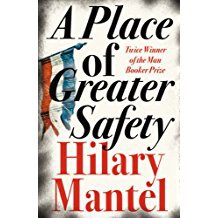
It takes nerves of steel to write a novel on the French Revolution. I can’t even begin to imagine how you’d approach such a project given the complex, ambiguous weave of personal and political motivations and relationships which contributed to this watershed in European history. On the other hand, it is an irresistibly dramatic subject: the notion of an ideal which rots even as it takes root. And the very fact that the “reign of terror” was ultimately birthed by staid, middle class, respectable lawyers somehow prefigures the cold calculations of the Nazi death machine – the Nazis, it should be added, employed the guillotine during the second world war.
Hilary Mantel’s narrative is a dizzying, polyphonic masterpiece. Rather than isolating a single character and their perspective – as she does in the Thomas Cromwell trilogy – we hear from many characters caught up in this political maelstrom, their voices rising and fading in succession, sometimes blurring into each other. While the story pivots around the relationship between Desmouslins, Dantons and Robespierre, we encounter their wives and lovers, their families, business associates and relations, aristocrats, Jacobins and Girondistes. And the text itself has an almost collage-type structure, laced with reports from newspapers and pamphlets, the prose sometimes slipping into pure dramatic dialogue. It’s a chaotic, mind-bendingly complex narrative which sometimes seems to teeter on the brink of losing its form, but Mantel keeps it all together with virtuoso skill.
The narrative is punctured by a robust wit and an eye for irony which somehow deflates our notion of these men and women as icons or emblems – and allows the reader to encounter them on a very human level. Robespierre’s belief in his own value to the revolutionary project, for example, contributes to his failure to save his childhood friend Desmoulins from the guillotine, while Danton – orator and man of the people – is revealed to be permanently on the take, determined to make his fortune and get out of the revolution while the going’s good. Ultimately, of course, it is the revolution which devours him before he can make good his escape.
What I also really appreciated about the book is how many women’s voices we hear, whether it’s the frustration of female politicians such as Anne Theroigne and Madame Roland, straining against the misogyny of male revolutionaries, or wives and lovers – Lucile Desmoulins, Louise Gély and Eleanor Duplay. So often in narratives of the revolution, these are the voices which get suppressed and it becomes male-oriented. The historical role of women has gone unacknowledged, but Mantel brings their voices to the fore, emphasising their insecurities, their own private tragedies and their political influence.
This is a novel which drops you headfirst into Paris at the end of the eighteenth century without too much of a lifeline. But if you’re prepared to take on the challenge, it’s a book which absorbs and fascinates, which prompts you to research as you’re reading, and offers a sustained and intense insight into the minds behind one of the most frightening episodes in European history. Worth not one read, but many.
Advertisements Podziel się:




